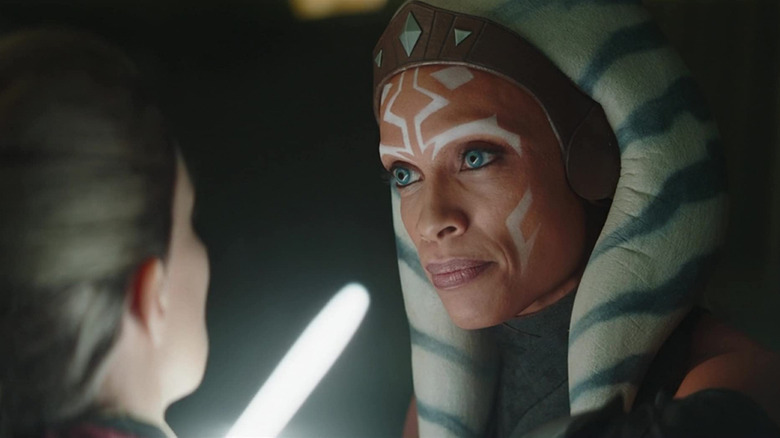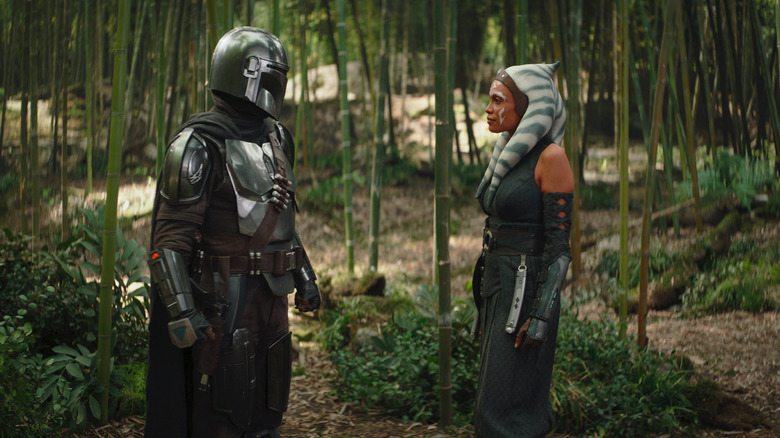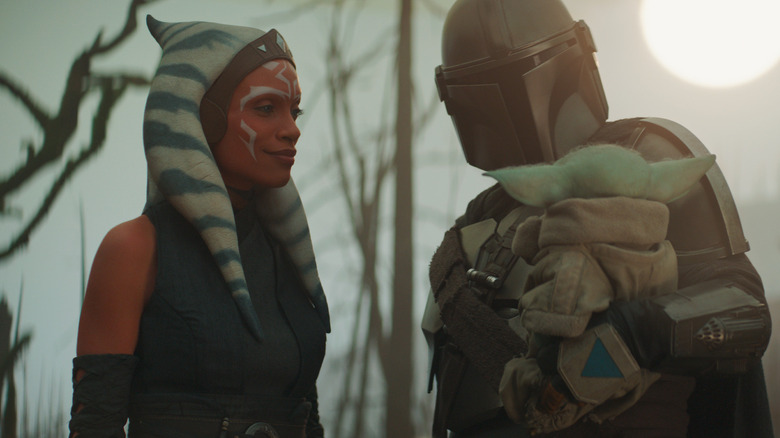The Mandalorian Stunt Double Teases Ahsoka's Crouching Tiger, Hidden Dragon Feel
The best "Star Wars" films or series are able to forge unique identities for themselves. "Andor" is a grounded espionage thriller; "The Empire Strikes Back" is a darker and more subversive take on the hero's journey or monomyth; "Star Wars Rebels" delves deeply into themes of nature, spirituality, and the Force; and so forth. In the case of "The Mandalorian," the show draws heavily from the same samurai movies and pulp sci-fi serials that inspired George Lucas to create "Star Wars," yet frequently tips its hat to the tropes of the Spaghetti Western. There's even more than a dash of Tolkien-esque fantasy mixed in there, especially in season 3.
With "Ahsoka," the impending "Mandalorian" spinoff series centered on Rosario Dawson's Force wielding Togruta, Ahsoka Tano, "Star Wars" looks to branch out into a genre it's only flirted with in the past: Wuxia. In an interview with the "Star Wars Sessions" podcast (via Star Wars News Net), Brendan Wayne — one of multiple stunt doubles who help bring "The Mandalorian" himself, Din Djarin, to life — compared "Ahsoka" directly to Ang Lee's classic 2000 Wuxia film "Crouching Tiger, Hidden Dragon," stating:
"[...] God, I really don't want to get everyone's hopes up and they don't feel the same way I do, but – it's like 'Crouching Tiger, Hidden Dragon' the way that it hit me, the majesty, the tapestries, and the beautiful kind of, there was always this kind of billowing feel of movement, the samurai feel. I really do feel that that's the presence Rosario as Ahsoka, and the presence of her, and the way she took to this role, and the way she attacked her physically, and the way her stunt doubles and everybody involved. [...] 'Ahsoka' is gonna have a flow and beauty that I cannot wait to see."
Samurai vs. Wuxia
It's worth taking a moment to clarify — and I bring this up with no shade intended at Brendan Wayne — that the samurai genre and Wuxia are separate entities. Samurai (and, by extension, samurai culture) are a type of warrior that emerged in medieval Japan, whereas Wuxia is an ancient type of Chinese fiction that dates back thousands of years and focuses on working-class Chinese martial artists. There is, of course, some overlap between these storytelling traditions in a broader sense, although they're each associated with their own distinct set of themes and aesthetics.
In a previous interview, "The Acolyte" showrunner and creator Leslye Headland revealed her upcoming "Star Wars" series also draws from Wuxia. To hear Headland break it down, Wuxia movies tend to follow Chinese warriors on "deeply personal" missions, "with people feeling wronged and having to make it right." In comparison, real-life samurai were employed to use their combat skills, so the stories about them usually involve samurai being hired to protect individuals like in Akira Kurosawa's "The Hidden Fortress," if not smaller villages under siege like in Kurosawa's "Seven Samurai." Notably, both of those movies were big influences on George Lucas' original vision for "Star Wars."
Why Wuxia makes sense for Ahsoka
"Ahsoka," which hails from "The Mandalorian" executive producer Dave Filoni, looks to function as a live-action sequel series to the acclaimed animated show "Star Wars Rebels" (which Filoni co-created). The series will pick up with its namesake as she continues her search for Grand Admiral Thrawn in the wake of her encounters with Din Djarin and Grogu. However, as important as her mission is when it comes to stomping out the last remnants of the Galactic Empire, the stakes are much more personal for Ahsoka. Finding Thrawn also means finds Ezra Bridger, the Lothal Rebel who shares a long history with Ahsoka and whom she swore to help rescue in the aftermath of the Empire's downfall.
In other words, if someone like Din Djarin is the "Star Wars" equivalent of a samurai, then Ahsoka Tano is much more of a warrior in the mold of a Wuxia protagonist at this stage in her story. Ever since she left the Jedi Order during the Clone Wars after being wrongly accused of a crime for which she was later exonerated, Ahsoka has been motivated by her principles and desire to restore justice to a galaxy far, far away. Far from a hired lightsaber, she chose to serve the Rebel Alliance of her own free will and continues to follow her own code of conduct, separate but related to that of the Jedi. If any "Star Wars" character's show ought to have a "Crouching Tiger, Hidden Dragon" feel, it's absolutely hers.
"Ahsoka" is tentatively projected to premiere on Disney+ during the latter half of 2023.


